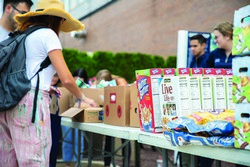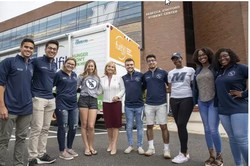The Student Government Association (SGA) partnered with Fulfill, a mobile food pantry, to provide nearly 100 students struggling with food insecurity or lacking an on-campus meal plan with fresh, nutritious food, on Sept. 17.
Mehdi Husaini, a senior biology student and former SGA president, was key in nurturing the relationship between Fulfill and Monmouth’s decision to approve the mobile food pantry.
“Fulfill became involved last year after an event both they and SGA attended, sponsored by the Center for the Arts, where we tabled to raise awareness about The Nest (the on-campus food pantry) and Fulfill’s ongoing programming in Monmouth county,” Husaini said. “I represented SGA at the event and wanted to see if we could do joint programming in the future. The mobile pantry idea was a result of the start of this partnership. Everyone at the organization has been so supportive and helpful over the last year, and it’s easy to tell they are committed to fighting hunger in New Jersey.”
The Nest is Monmouth University’s on-campus, student-run food pantry which aims to increase access of nutritious meals to students struggling with food insecurity. The facility is open 3 days a week and secured its location on the lower level of the student center, maintained inventory, and increased community outreach last year.
“It really is a team effort and as this year’s manager, I’m looking to continue to expand products we offer to accommodate for dietary needs and convenience,” Husaini said.
 Mary Anne Nagy, Vice President for Student Life and Leadership Engagement, remains passionate about ending the stigma against food insecurity on Monmouth’s campus. “It’s painful to hear people say all Monmouth students are rich and they all buy BMW’s, that’s just not the case at all,” explained Nagy. “I know how hard students and their parents work, so it’s important for us to make sure that we do as much as we can to maybe help lighten that load a little bit.”
Mary Anne Nagy, Vice President for Student Life and Leadership Engagement, remains passionate about ending the stigma against food insecurity on Monmouth’s campus. “It’s painful to hear people say all Monmouth students are rich and they all buy BMW’s, that’s just not the case at all,” explained Nagy. “I know how hard students and their parents work, so it’s important for us to make sure that we do as much as we can to maybe help lighten that load a little bit.”
SGA President Mike Fazzino, a senior communication student, also feels food insecurity is often a misunderstood issue on campus, with some assuming the problem is far smaller than it actually proves to be. “The big takeaway is that no one is immune to food insecurities,” he said. “There are people that are struggling and are literally feeding themselves paycheck to paycheck, not knowing how they’re going to fund their next shopping trip.
“As a community, as a campus, we have to do our part in helping those people,” Fazzino continued.
The future of food insecurity on campus remains to be seen; however, those involved with the issue’s awareness remain optimistic about the direction Monmouth University is aiming towards.
“Between the mobile food truck and the food pantry in the student center, I feel like there’s a community growing around this issue,” Fazzino said. “It’s getting more and more popular, which can only be positive for the campus.”
Although SGA envisions the evolution of a larger donation center with a wider variety of free items, nutritious meals remain the top priority for the foreseeable future.
The pantry often focuses on dry goods such as peanut butter, pasta, or cereal. However, fruit, vegetables and other kinds of meat are offered to create a balanced diet.
“I think the ultimate endgame would be putting together a larger donation center where students can not only come for their food, but items such as toiletries and school supplies as well,” Fazzino said. “That’s a conversation for one day down the road, but now we’re just continuing on growing the food pantry, as well as evolving our partnership with Fulfill.”
The expensive costs of higher education can push students to spend their money in unhealthy ways, Nagy explained.
“If you have the choice between a book that you need to buy or paying your rent, you’re more likely to choose one of those over buying some food that you need,” Nagy said. “During the collaboration with Fulfill, 3,500 pounds of food was given out to students. There is clearly a demand for solving this issue,” she continued.
Husaini feels that the success of Monmouth’s collaboration with Fulfill could encourage other campuses to follow suit.
“The idea is to destigmatize food insecurity through a large-scale event, starting a conversation about food insecurities on college campuses as a whole,” Husaini said. “When I spoke to Fulfill’s representatives earlier, they told me Brookdale Community College is also starting an on-campus food pantry as a result of Monmouth’s example with The Nest.”
“Ending the stigma around food insecurity is no easy task,” Husaini goes on to say. “Only through public awareness and education on the subject can it ever be eradicated.”
“The future is looking better for students with difficulty accessing food, largely due to SGA starting a conversation about an issue that really hits home for so many members of the Monmouth family, Husaini said.
“Hopefully the more we talk about the issue and put in effort to help, we can end hunger at Monmouth and inspire others to do the same in other communities.”
PHOTOS COURTESY of Monmouth University



